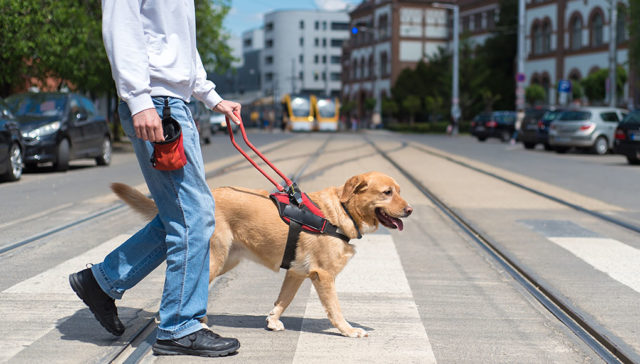
Table of Contents
- How Can Service Dogs Help With Sleep Disorders?
- PTSD
- Other Sleep Disorders Service Dogs Can Assist With
- How Can a Person Get a Service Dog?
- How Much Does a Service Dog Cost?
- Types of Service Dogs
- Which Breeds Make the Best Service Dogs?
- Service Dogs and Frequently Asked Questions
- Service Dogs For Sleep Disorders Final Thoughts
Do you have a hard time sleeping? A sleeping disorder like Sleep Apnea, perhaps? Luckily for you, there are now service dogs for sleep disorders.
You can train service dogs to recognize when an individual is experiencing sleep troubles. Service animals are a constant source of support even before the pandemic.
A pet is a great companion and could be a great addition to a family. About 70% of families in America own a pet, including dogs, cats, birds, and many others.
But federal law doesn’t recognize service animals as pets. Service animals like service dogs are viewed as equipment necessary for Persons with disabilities.
Service dogs help the lives of people with disabilities. People with diabetes, epilepsy, or PTSD can gain many benefits from service animals.
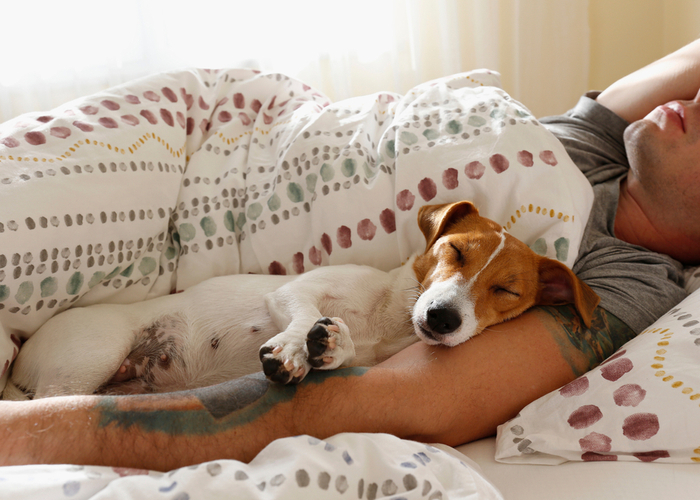
How Can Service Dogs Help With Sleep Disorders?
A service dog can see the signs of disturbed sleep. For instance, they are alert if the owner is tossing and turning or vocalizing. When this happens, the service dog wakes up its owner and provides comfort and a sense of safety.
Sleep Apnea
Before we get into this, let’s first discuss these sleeping disorders themselves. Sleep apnea is a sleep disorder where breathing repeatedly stops and starts again.
The most common symptoms are severe snoring, pause in breathing, and random gasps for air. You may be thinking, “these symptoms are not that serious!”. That’s where you’re wrong.
Sleep apnea can cause some health issues if not mended. It can lead to high blood pressure, obesity, stroke, and even heart failure.
In addition, there are three types of Sleep Apnea which are Central, Obstructive, and Complex. The most common type is Obstructive Sleep Apnea.
- Central – The brain fails to send the correct messages to the muscles that control the breathing.
- Obstructive – The most common type of sleep apnea, where trouble causes pauses in breathing.
- Complex – The combination of central and obstructive sleep apnea.
Service dogs can help with sleep apnea in multiple ways. It can be through:
Nighttime Warnings – Sleep apnea can lead to anxiety, and service dogs can sense that. They also recognize if the person is experiencing significant sleeping problems.
Daytime Safety – Sleep apnea blocks the idea of a restful night of sleep. This means that in the morning, people can feel tired or unfocused throughout the day.
Service dogs can help you feel or stay present and can provide assistance to guide things when you’re confused. In addition to safety, they can also notify you of certain dangers.
Emotional Aid – On top of that, service dogs can also provide emotional support. Sleep apnea can cause a lot of stress for people who live alone.
Safety can also be through providing companionship throughout the day. People can feel safe knowing there’s another physical presence with them.
They can also help ease anxiety-related problems.
PTSD
There are service dogs that are specifically trained for people suffering from PTSD. A lot of these people are military veterans. But firstly, what even is PTSD?
PTSD or Post-Traumatic Stress Disorder is a stress-related trauma disorder.
People with PTSD may experience nightmares that include past traumatic events or difficulty in falling asleep.
If a service dog senses that its owner is experiencing said nightmares or even disturbed sleep, it can provide safety and comfort.
What PTSD Service Dogs are Trained To Do
- PTSD Service dogs are trained to provide emotional support to their owners.
- The Service Dog’s primary focus is their owner.
- Service dogs provide a sense of security to their owner
- Service dogs are trained to watch over you even when you sleep
Other Sleep Disorders Service Dogs Can Assist With
Nightmares
Service dogs are trained to know when you’re having a nightmare. When service dog sees an increase in movement in bed or vocalizations while sleeping, they’ll wake up their owners and provide any necessary medicine.
Narcolepsy
Service dogs can also determine the tiny physical changes that occur in your body when you’re having an attack while sleeping. The dog will alert you through barking or licking.
A service dog can also cushion people who seem likely to fall and stand guard if they fall in public places.
Parasomnias
Parasomnias is a disruptive sleep-related disorder where the person is experiencing abnormal movements, talking, emotions and actions while sleeping.
Like the other disorders above, the service dog can wake the owner and fetch any necessary medicines. They can also restrict the owner from movement to avoid the owner from self-harm.
Sleepwalking
Sleepwalking is a form of Parasomnia. But it’s important to know what service dogs do when their owner is experiencing it.
Service dogs can lead them to a safe place. They ensure that you’ll stay away from stairs, leaving your house, or any other dangerous place where you can sleepwalk.
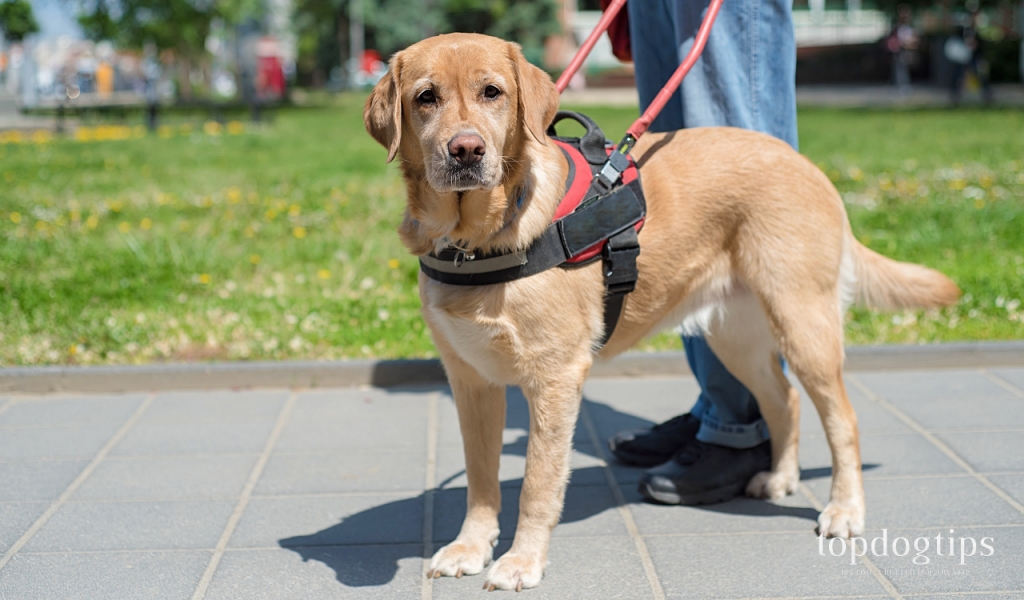
How Can a Person Get a Service Dog?
Professional service dog trainers are located throughout the U.S. If you’re having sleep problems like Sleep Apnea, you have to have a diagnosed physical or mental disability that negatively impacts your day-to-day activities and safety.
Make an appointment with your physician and discuss how can a service dog potentially benefit you.
You must be present while your dog is being trained, as it will be catered to your specific tasks and needs. This way, your service dog can know how to take care of you properly.
How Much Does a Service Dog Cost?
A service dog will not be cheap. Even the training can go between $25,000 and $40,000. But that’s not all. You need to consider the cost of food, grooming, and other veterinary expenses.
But don’t you worry, there are now nonprofit organizations that can help you with other medical needs in support of a service dog. So even if you’re having financial issues at the moment, that doesn’t disqualify you from having a service dog.
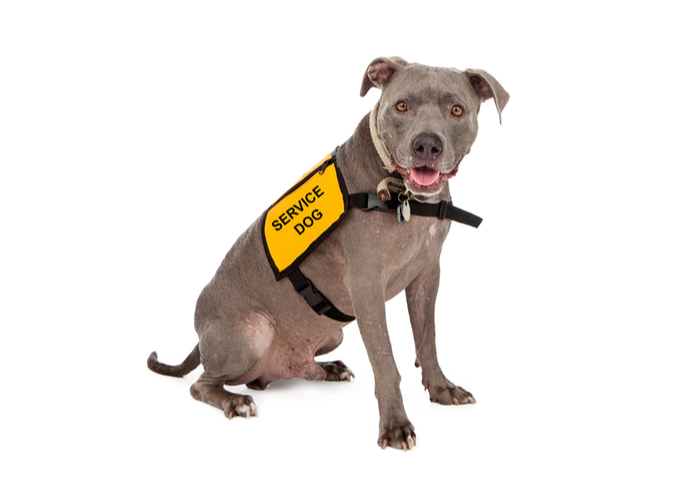
Types of Service Dogs
There are many types of service dogs because each different kind caters to varying types of conditions.
Allergy Service Dogs
Yup! There are service dogs that are trained to detect the smell of allergens. Let’s say you’re allergic to peanuts. With the dog’s strong sense of smell, he will alert you that there’s peanut in the food that you’re about to eat.
Allergy detection service dogs can pick up the scent of a harmful allergen before even you can eat it. In addition, most of these dogs wear a vest for medical information and your needed medication.
Autism Service Dogs
Autism service dogs are usually paired with children to help them navigate social settings. Many people suffering from autism tend to have trouble reading social settings and connecting with other people.
They are also trained to keep kids with autism from running away or doing harmful behaviors.
Diabetic Alert Service Dogs
These service dogs alert their owner for potential high or low blood sugar. When the dog alerts the owner, the owner now tests their blood and injects insulin or glucose depending on their sugar levels.
You can even train some service dogs to call 911 on a particular K-9 alert phone when they’re home alone and need immediate assistance.
Guide Dogs
Probably the most common service dog out there are Guide Dogs. Their general task is to guide blind and low-vision people to navigate their surroundings. These dogs wear a harness for the owner to hold rather than vests.
Guide dogs practice selective disobedience. This is where they obey specific commands but still make the best choices based on their assessment of the problem.
For instance, if the owner commands that they cross the street, the service dogs know that there are still cars coming.
Hearing Dogs
The name itself is pretty self-explanatory. These dogs are trained to assist deaf or people who have difficulty hearing.
When a hearing service dog hears a particular sound or cue, they will alert or guide them towards the noise. These sounds include fire alarms, doorbells, knicking, phones, warnings, and even the owner’s name.
Mobility Assistance Dogs
People with spinal cord injuries, arthritis, and brain injuries rely on mobility assistance dogs to help do everyday tasks.
These tasks include retrieving certain items, opening doors, and turning on lights.
Seizure Alert Dogs
Seizure alert services dogs help their owners to call 911 with a particular K-9 alert phone. Not only that, but they also help their owners stay conscious or regain consciousness after a seizure.
These service dogs also bring their required medicine after a seizure.
Which Breeds Make the Best Service Dogs?
A dog’s sense of smell is about 10,000 to 100,000 times better than humans. But a great sense of smell is not enough to be a service dog.
Dog breeds with characteristics that are calm, intelligent, friendly, and loving are usually used as service dogs
Here’s a quick list of the best dog breeds for service dogs:
- Golden Retrievers
- German Shepherds
- Labradors
- Great Danes
- Border Collies
- Pomeranians
- Poodles
- Boxers
- Bernese Mountain Dog
- American Staffordshire Terrier
Service Dogs and Frequently Asked Questions
Should a service dog sleep in your bed?
This depends on the situation, but many service dog owners sleep with their dogs in their beds or beside their beds. Service dogs can assist them with nighttime challenges.
From nightmares to sleepwalking, you can benefit from having your service dog beside you while you sleep. However, certain large dog breeds can take up too much of your space. So giving them a bed beside you is not a bad idea.
How much is a service dog for narcolepsy?
A narcolepsy Service Dog can cost between $10,000 to $30,000. But if you’re a veteran, there are specific programs around the U.S. that offer service dogs for free or for a meager price.
If you cannot afford a service dog, getting an average pet dog can still provide emotional support for people suffering from anxiety and depression. But they won’t have the same legal protections as service dogs.
What can other mental illnesses service dogs help with?
Psychiatric service dogs are trained to focus on helping people with other mental illnesses like:
- Anxiety
- Panic Attacks
- Bipolar Disorders
- Depression
- Social Phobias
- Schizophrenia
- Obsessive-Compulsive Disorder (OCD)
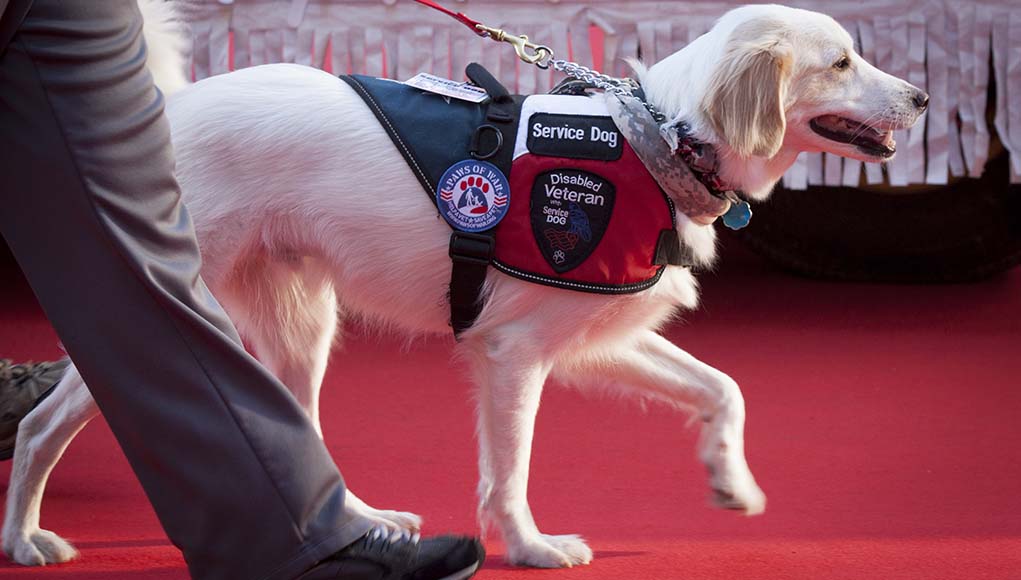
Service Dogs For Sleep Disorders Final Thoughts
In this day in age, dogs are not just great companions, but they can be a great help in our day-to-day lives. Persons with Disabilities benefit a lot from a service dog.
If you’re having a hard time at night, service dogs are now for sleep disorders.
For instance, if you’re struggling with sleep apnea, a service dog can help alert you when you’re having trouble sleeping. They can alert you and wake you up when they sense that you’re having a nightmare.
If they see you tossing and turning in your sleep, it can indicate that you’re having night terrors.
In addition, if you’re coming home from the military and struggling with PTSD, you can gain lots of benefits from a service dog. PTSD service dogs can help with emotional support and provide a sense of security.
There are also a lot of different types of service dogs. From physical to mental illness, man’s best friends have come a long way.












